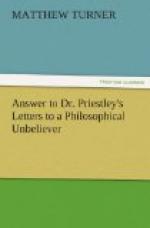After observing that things are in an improving state, Dr. Priestley allows, that the moral government of the universe is not perfect. From thence he proceeds to assert, that atheists may believe it within the course of nature, that men as moral agents may after death be re-produced, and therefore that there may be a future state though there be no God, because he reasons it may be in the course of nature. This allows that the course of nature may be as it is without a God, and that there is therefore no natural proof of a Deity. His farther argument on this head is, that “things usually happen in a state of nature that are proper. A future state is proper. (To carry on the supposed state of melioration and complete the moral government of the universe.) It is therefore probable.” This is an argument perhaps more of wish than probability, but let it have such force as belongs to it. It is not the wish of the answerer by supporting atheism to give encouragement to immorality, but should he unwarily or with weak minds do so, the argument of the Deity’s existence is independent of such considerations. It were better to seek another support for morality than a belief in God; for the moral purpose in believing a Deity (an invisible Being, maker of all, our moral governor, who will hereafter take cognizance of our conduct,) is not a little checked by considering, that he leaves the proof of his very existence so ambiguous, that even men with a habit of piety upon them cannot but have their doubts, whilst on this existence so much of the moral purpose depends. If this is not an argument against the morality of a Deity, it is at all events one against his infinite morality though moral is an attribute to be given to him in the infinite degree as much as any other.
It is said, infinite intelligence must have procured a necessary fitness of things, and that this forms morality. “His will could not be biassed by other influence; therefore he must have willed morality, because necessarily fit. Then comes infinite power, and yet no morality in the world or a very small portion of it. We cannot to any purpose, do what we will, argue against experience. That it must be, yet that it is not. What must be, will be. If it is not, there is no must in the case.
It is next said, that virtue gives a better chance for happiness than vice. This also is but a weak argument for the moral government of the universe, unless it be for a moral government by chance. Virtue ought to be the certain and immediate parent of happiness, if a moral governor existed with an uncontrouled dominion. If virtue tends to happiness, or has only a better chance of doing so, it is allowed, that a sensible atheist should hold it right to be virtuous. The latter end of a righteous man is certainly more likely to be happy than that of an unrighteous one. But let an atheist be righteous, and he can be as certain of happiness in his latter




